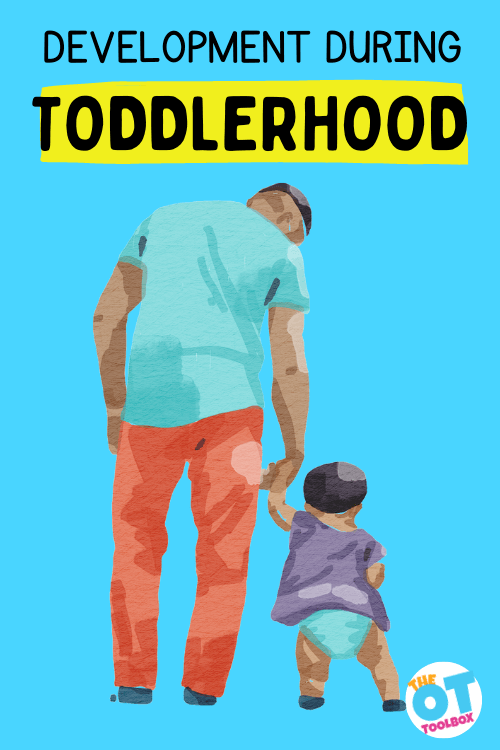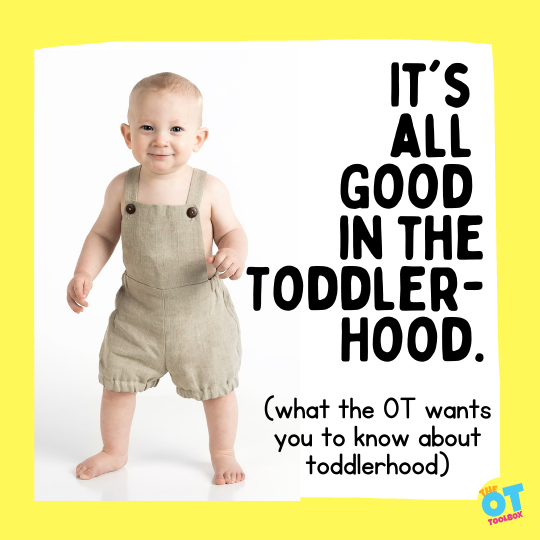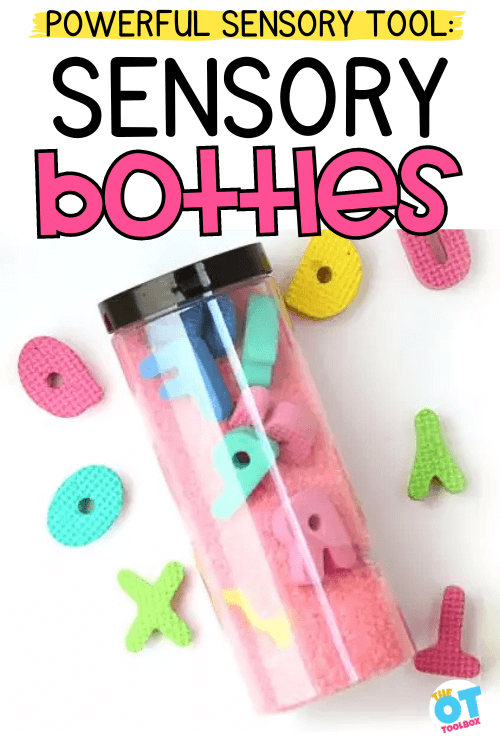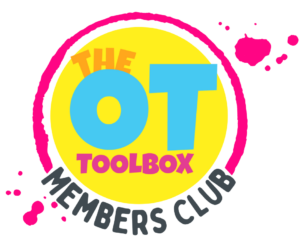The toddler years can be a struggle! From the age of one year to 3 years, toddlers grow and develop immensely. But when parents are in the midst of toddlerhood, it can seem like the never-ending tantrums, meltdowns, sometimes crazed attempts at independence, and picky eating, sleep issues, etc… never end. Not to mention learning new words (with little-to-no filter), sleep changes, appetite and eating considerations, toddler years can be a real challenge to parents. But as an occupational therapist, there is a very real developmental need for these toddler antics.
Be sure to read our resource on newborns not sleeping through the night, because sometimes sleep habits can carry over to toddler sleep issues that impact function, development, and family dynamics.
Toddlerhood gets a bad rap with terms like the “terrible twos” and the “three-nager years”. But is it all bad? Here’s what your friendly OT wants you to know…

Toddlerhood Development
So, what is it about the toddler years? These cute packages of rolly, squishy, no-longer babies are little people with BIG emotions, BIG personalities, and BIG smiles. Some of the sweetest memories I have from when my kids were younger come from the toddler stage, when little voices pronounce words totally incorrectly…but in the cutest way possible. Those big teethy smiles and non-stop play was nothing but learning and developing skills.
As a mom, I loved to watch my littles learn. I loved to kiss their sweet heads to sleep each night. Oh, there were meltdowns, demanding, whining breakdowns that these cuties experienced (daily). There were messes, spills, diaper issues, and the house was in a constant state of disaster zone.
But as the occupational therapist? I knew this was all part of the stage of development and toddlerhood means messy repetition. (i.e. Yes, we will need to practice cleaning up blocks 37 times a day. Yes, we will do it again tomorrow).
But, from that perspective of a pediatric developmental professional, there is so much more to say about the toddler years. ALL of that pushing buttons, whining, changing minds, meltdowns, carrying purses full of toys, getting into the kitchen cupboards, streaking naked through the house…it’s all essential toddler development! Really!
We have a great resource on child development that covers developmental milestones. From that blog post, you’ll discover the toddler developmental stages that occur from 1-3 years.
This developmental checklist can help to define specific milestones.
Early childhood is a critical time when children develop skills they will use throughout their lives. These areas of development include:
- physical
- cognitive
- communication/language
- emotional
- social skills
It is during the first years of life that children show a tremendous level of growth in each of these areas.
Occupational Therapy and Toddlerhood…
As a pediatric OT, there are a few sticking points that is important to remember.
The toddler years get a bad rap for behaviors, saying “no”, tantrums, going “boneless” as we used to say about sudden tantrums where the toddler flops on the floor in refusal for some task, activity, or thing like getting dressed. However, if there are extreme issues, regressions, or you have a gut feeling about certain developmental concerns, these may be toddler behavior red flags to explore in further detail along with a pediatrician.
But, here are a few things about the “good” of toddlerhood…

- Have patience with your toddler.
Because of the tremendous amount of development, it is easy to become overwhelmed by skills (running, hopping, getting dressed, manipulating toys and materials, self-feeding…the list goes on and on!) Plus, young children want to exhibit independence in these areas. They want to do what mom or dad or big siblings are doing, but they may not have the skills to do so. Frustration ensues!
Things to remember is that the child is developing in all of these areas at once. By watching routines, listening to parents talking, watching siblings, they learn to throw, carry, put away, wash, color…these are multi-faceted skills. There is sensory, motor, cognitive, visual all happening at once with daily tasks.
Plus, the cognitive development occurring at the same time means that following directions are not always on target with what the small child wants to do. They want a piece of toast for breakfast. Then they don’t. It can be easy to lose patience as the toddler has a tantrum on the floor, but they are managing emotions, thought processes, decisions, and communication challenges all at once. It can be a lot to process! Be patient as the adult in the situation.
Patience is key as your little toddler develops skills at the rate that is right for them.
That brings us to our next point.
2. Remember that each child is different.
Toddlers grow and develop at a fairly predictable course and rate. There are general developmental expectations that happen during the toddler years, called developmental milestones. However, not all child achieves these milestones at the same time. And that’s ok!
It can be easy to become upset as a parent when a friend’s child achieves skills or abilities. Remember that each child is on their course of development. From birth to three years, a child visits the pediatrician many times.
You’ll experience many questions on development during those visits, where the doctor or staff ask about milestones. If there is a concern with development, or evident delay, this is where you can explore services to support needs.
Even through each toddler is different and development occurs in different stages, it’s all part of showing independence. This can mean picky eating, throwing food, saying “NO!” or any other aspect of showing independence.
3. Development occurs through play.
Occupational therapy practitioners use play as a tool to promote more play! And it’s through play that toddlers develop skills.
It’s through play that toddlers achieve stability, build relationships with parents, siblings, and others.
They test boundaries and explore the world around them.
Play offers opportunities to use their reflexes, transform motor skills, and distinguish refined motor skills (i.e. using their arms and legs to achieve a desired action such as getting up those stairs!)
Sensorimotor skills expand and toddlers gain control in play objects and tool use; They begin to use crayons, spoons, forks, and manage clothing. Previously, we’ve shared the best crayons for toddlers that support this development through functional play.
Young children are fascinated by mastering new skills and learning new things. You might see them drawn to activities or experiences that offer sensory experiences, are repetitious, or involve exploration. But even though novel opportunities support child development, routine is essential.
Read about the power of play for more ideas to support your toddler.
Physical Development during toddlerhood
Going back to the development aspect, you can generally expect to see the following skills developed during toddlerhood:
12-18 months
- First steps
- Walking
- Climbing stairs
18-24 months
- Running
24-36 months
- Jumping
- Begin to ride a tricycle
3 years
- True run with both feet leaving the ground
- Walk upstairs with alternating feet
- Walk downstairs
- Able to remove most clothing
Cognitive Development During Toddlerhood
From 1-3 years of age, so many cognitive skills are built and expanded upon. You’ll notice in the list below that many of these cognitive skill components are grounded in play. Remember that play builds skills! Let’s break down the skills by age:
12-18 months
- Includes others at recipients of play behaviors
- Imitates new behavior
18-24 months
- Demonstrates invention by combining mental combinations
- Finds hidden objects (separation skills)
- Shows differed imitation
- Uses toys or dolls in pretend play
24-36 months
- Substitutes objects in pretend play
- Integrates themes in play
3 years
- Begins operational thinking
- Counting words up to 5
- Can solve nesting cup problems
Language Development for Toddlers
The first few years are a huge time for development of receptive language and expressive language. Here are some specifics:
12-18 months
- Expresses self through jargon, sounds, cries
18-24 months
- Understands multi-word phrases/sentences
- Uses multi-word phrases to express thoughts (“Me up” to indicate a desire to be picked up; “Mommy go” to indicate that mommy has left the house)
24-36 months
- Initiates a conversation with words or phrases
- Uses 2 part sentences or phrases (“Me go home.”)
3 years
- Understands positional terminology (in, on, under)
- Uses more complex sentences
- Distinguishes between images and words or text on paper or in books
- Begins to generalize rules for verb tenses and using plurals
Toddler Social-Emotional Development
Social emotional development occurs even from the young age in toddler years. Social skill development occurs through interaction with others, play, and day to day tasks. Here are some milestones you may see:
12-18 months
- Experiences peak of separation anxiety
18-24 months
- Demonstrates less separation anxiety
- Begins to show empathy for another person, animal, toy
24-36 months
- Begins to respond with empathy to another person’s distress
- Includes others in pretend play
3 years
- Shows physical aggression over verbal aggression when distressed or upset
Toddlerhood Tips
So, how can you and your toddler thrive during these hectic years? A pinch of patience, play, play, and more play! We actually have actionable strategies over on our toddler play page, including fun ways to play with your toddler that inspire development.
Some quick tips (described in more detail over on that main toddler page) include:
- Meet the level of the child.
- Set up a toddler safe space.
- Be a balanced play partner.
- Enjoy & have fun with the play.
- Limit screens. (Or use in moderation.)
Transforming Toddlerhood With Play
Ask any occupational therapist and you’ll see that play is the way and the means to develop skills during these years. Looking for therapist-approved activities to inspire learning through play for toddlers? These are some of our favorite ideas:
- Social emotional development with books
- Scooping Ice Fine Motor Play for Toddlers
- Fine Motor Pincer Grasp Color Match for Toddlers
- Toddler Sensory Floor Play
- Blue-Themed Sensory Play for Toddlers
- Pipe Cleaners and a Cardboard Box
- Fine Motor for Toddlers
- Fine Motor Play for Toddlers: Crafting Poms
- Fine Motor, Eye-Hand Coordination for Toddlers using Wikki Stix
- Red, White, and Blue Toddler Easel Art
- Toddler Ping Pong Visual Motor Water Play
- Color Matching Legos
- Color Sorting for Toddlers: Dyed Pumpkin Seeds
- Fine Motor Play for Toddlers: Pipe Cleaner Fun
- Teaching Body Parts to Toddlers
- Christmas Ornament Sorting Activity for Toddlers
Or, try making a craft with 2 year olds and 3 year olds…an easy suncatcher activity using items you have in the house!

Colleen Beck, OTR/L has been an occupational therapist since 2000, working in school-based, hand therapy, outpatient peds, EI, and SNF. Colleen created The OT Toolbox to inspire therapists, teachers, and parents with easy and fun tools to help children thrive. Read her story about going from an OT making $3/hour (after paying for kids’ childcare) to a full-time OT resource creator for millions of readers. Want to collaborate? Send an email to contact@theottoolbox.com.


